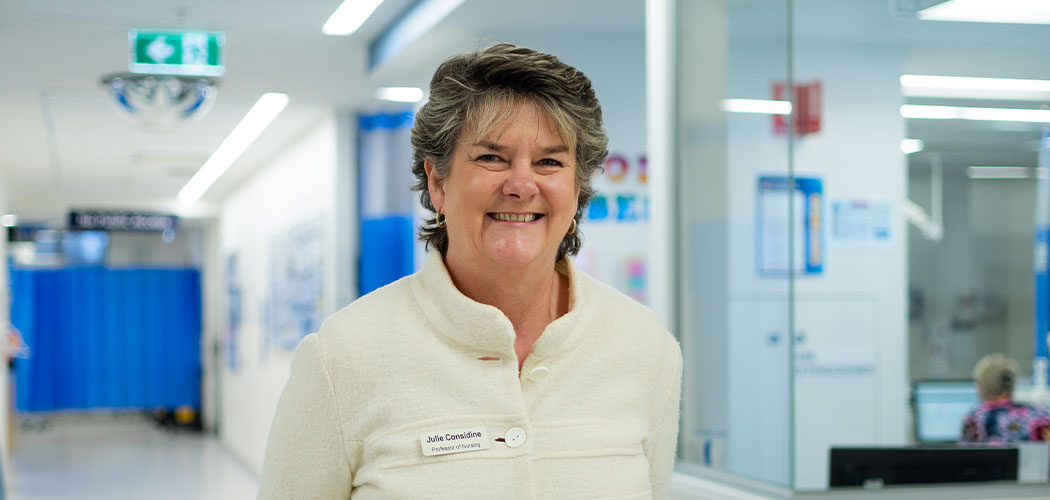From the moment she stepped into the Royal Melbourne Hospital’s Emergency Department as a 19-year-old second-year student, Professor Julie Considine AO was captivated by the specialty of emergency nursing.
“I loved the unpredictability,” she recalls.
“I really loved that it spans all specialties, so you get to use all your skills as a nurse.”
Professor Considine has worked in mixed adult and paediatric EDs for most of her clinical career.
“We’re the first clinician that a patient sees at triage,” she explains.
“We’re responsible for assessing risk and allocating a category based on urgency. As nurses, we’re responsible for those patients the whole time they’re waiting to see a doctor. That can mean hours and hours. We’re responsible for their safety, wellbeing, comfort, and even once they’ve seen a doctor, it’s still emergency nurses that continue the ongoing assessment and management of those patients.
“I really enjoy that level of responsibility. You hope that you can make someone’s ED care as best it can be, because no one wants to be in the ED.”
After progressing to working as a clinical nurse educator in various EDs across Melbourne for more than a decade, Professor Considine made the transition into the university sector to teach emergency and critical care nursing.
She is currently Chair in Nursing at Eastern Health and a member of Deakin University’s Centre for Quality and Patient Safety Research in the Institute for Health Transformation (IHT). Her role focuses on setting the strategic direction for nursing and midwifery across Eastern Health and conducting and supervising research largely focused on patient safety, including within emergency nursing.
In June, Professor Considine was globally recognised for excellence in nursing education by the US based Emergency Nurses Association (ENA), the largest professional body for emergency nurses in the world, with 50,000 members.
The award recognises a distinguished career spanning three decades that includes pioneering work such as developing Australia’s first transition to specialty practice program in emergency nursing in 2000, which created a pathway into emergency nursing for registered nurses from others areas of the hospital, and redesigning the postgraduate specialist nursing curriculum for Deakin in 2007, which remains the only Australian School of Nursing using Team-Based Learning as an active and collaborative education strategy in post-graduate nursing.
“It was nice to have nearly two-and-a-half decades of educating emergency nurses recognised and acknowledged,” Professor Considine, who has taught more than 2,000 nurses at graduate certificate level, tells the ANMJ.
“Being recognised by your peers always makes you feel good and like you’ve made a meaningful contribution.”
Professor Considine lists developing the first transition to specialty practice program in emergency nursing as one of her career highlights, with many of its former participants now nurse managers, educators, and researchers.
“Now, almost all emergency departments in Australia run some type of transition program. So, I’d like to hope it’s my legacy a little.”
Some of her current research projects include a major five-year study of emergency nursing looking at implementing a structured framework for patient assessment and management called HIRAID in a bid to improve safety, quality, and patient satisfaction with ED care.
Reflecting on her role in shaping emergency nursing education, Professor Considine believes that Australia’s ED nurses are among the most educated in the world.
“When you look at Australian emergency nurses, if you take a patient who is critically ill, for example, who’s had a cardiac arrest, who’s on a breathing tube, who’s on lots of medications to support their blood pressure, it’s nurses that manage all of that.
“In other countries around the world, they have respiratory therapists, or they might get the anaesthetist to come and manage the ventilator, and doctors have a greater role in managing the medications. But in Australia, nurses do all that in collaboration with our medical colleagues. Those patients are completely dependent on us.”
Nevertheless, Professor Considine admits that the reality for emergency nurses on the frontline remains challenging, exacerbated by the COVID-19 pandemic, staff shortages, occupational violence, and the increasing demand for emergency care.
“I think people still want to get into the speciality,” she says.
“Those that do get into it, love it. But burnout is a real problem. And I think keeping nurses well and healthy in such a challenging speciality will be the next challenge that we’ll have to navigate.”








